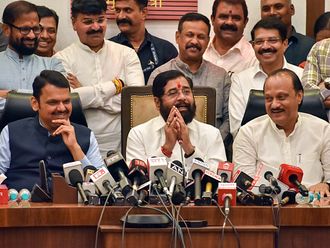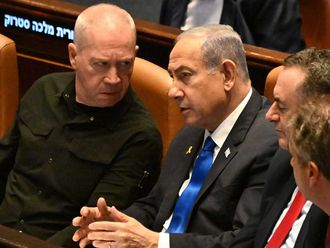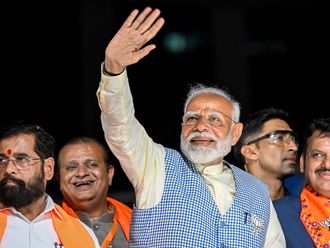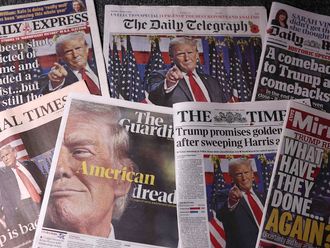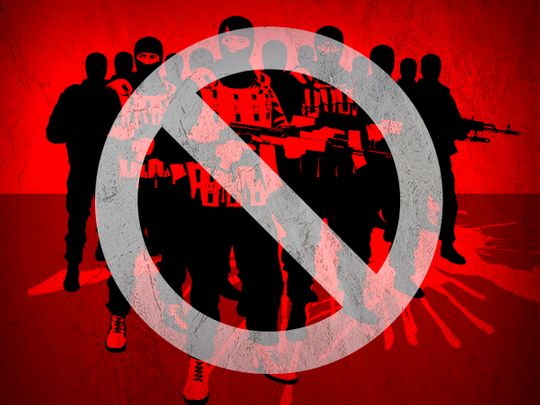
The Global Coalition to defeat the Daesh toppled the group from its areas of territorial control in the Middle East, but since then the group’s “online Caliphate” has metastasised.
Too often, we have seen Daesh and other extremists misrepresent religion and political grievances to serve their own ends, contributing to the destabilisation of fragile states and causing untold suffering.
The ideology that lured thousands of fighters to conflict zones continues to spur violence on a global scale, but for every successful attack, law enforcement thwarts many more.
To defeat Daesh ideology, we must offer compelling narratives of tolerance, peaceful acceptance, and economic prosperity that counter extremists’ exploitation of religion and politics.
A joint effort to combat extremism
The United States and the United Arab Emirates established the Sawab Center in 2015 to expose the emptiness of Daesh’s hateful propaganda and advance the Global Coalition’s work. Sawab messages daily on Facebook, Twitter, Instagram, and YouTube in Arabic, English, and French.
The Center reflects both countries’ robust partnership in the battle against violent extremism, and the need for it has never been greater. These sentiments of peace and tolerance represent the majority but can drowned out in corners of the internet or media where extremist narratives thrive.
The precipitous growth in jihadist activity in Sub-Saharan Africa is of particular concern. Violent extremist groups like Boko Haram and Daesh in West Africa Province, cause grievous harm to the vast majority of people committed to peace and tolerance.
According to the United Nations, in just over a decade these groups have killed 36,000 people and displaced two million from their homes. In several African countries, extremists are targeting humanitarian workers and disrupting efforts to stop the spread of COVID-19.
These jihadist attacks in Africa draw from and find their echoes in Daesh propaganda. Each week, Daesh’s propaganda leaflet “An-Naba’a” touts the bloody toll of their operations, in a desperate attempt to stay relevant and motivate violent attacks throughout the world.
To help amplify local voices that speak out against jihadist activity in Sub-Saharan Africa, the Sawab Center launched a five-day messaging campaign on March 7 with the hashtag #AfricaAgainstExtremism.
The campaign highlighted inspirational stories of the struggle against extremism, including excerpts of documentaries and films depicting the struggle against extremism. It stressed the positive role African youth can play in determining their countries’ future.
Messages of tolerance and peaceful coexistence
Sawab’s Africa campaign, and its messages of tolerance and peaceful coexistence, reflect deeply held values shared by the United States and the UAE that contradict the jihadist agenda.
Daesh reduced Mosul to ruins, but the UAE has been in the forefront of promoting reconstruction and cultural preservation there, from the Al-Nuri mosque to the Al-Tahira and Al-Saa’a churches.
The Pope’s visit to Iraq in early March builds on his visit to Abu Dhabi in 2019, where he signed a document on “Human Fraternity” with Sheikh Ahmed Al-Tayyab, the Grand Imam of Al-Azhar Mosque.
An “Abrahamic House,” now under construction in Abu Dhabi, will co-locate a church, synagogue, and mosque on the same plot of land. That initiative complements the historic normalisation of UAE’s relations with Israel.
Online messaging is just one part of the tool kit in countering violent extremism, but it remains vital to contest the online spaces that extremists are trying to exploit.
Through international partnerships, combined operations, information sharing, and educational campaigns, the UAE, United States, and other like-minded partners are countering terrorist propaganda, preventing youth from becoming radicalised, and equipping communities with the tools to fight against extremism.
This multilateral and multidimensional approach has been central to impeding extremist movements and stopping acts of terrorism which destabilise our societies and threaten the security and welfare of our peoples.
The effort to forge global solidarity and consensus against Daesh’s hateful agenda continues. Join us and become one of the Sawab Center’s more than 8.2 million followers. In our shared struggle against extremism, your help can make all the difference.
Omar Ghobash is the Assistant Minister for Culture and Public Diplomacy at the UAE’s Ministry of Foreign Affairs and International Cooperation (MOFAIC); Christopher Hodges is the Deputy Assistant Secretary of State for Press and Public Diplomacy and Assistance Coordination in the US Department of State’s Bureau of Near Eastern Affairs.


